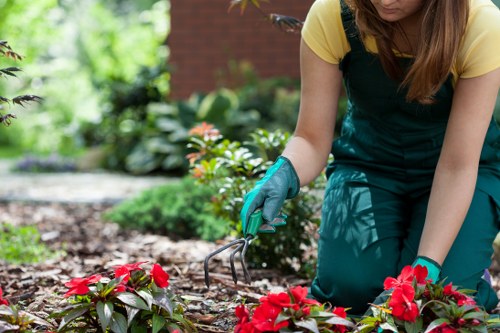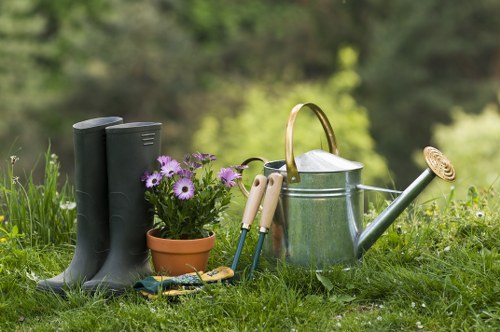Garden Maintenance in Westminster
Maintaining a beautiful garden in Westminster requires a blend of passion, knowledge, and consistent effort. Whether you're a seasoned gardener or a green-thumbed novice, proper garden maintenance ensures your outdoor space remains vibrant, healthy, and inviting throughout the year. This comprehensive guide delves into the essential aspects of garden maintenance in Westminster, offering practical tips and professional insights to help you cultivate a thriving garden.
Westminster's unique climate and urban environment present specific challenges and opportunities for gardeners. From choosing the right plants to implementing effective maintenance routines, understanding the local conditions is crucial for garden success. Additionally, leveraging professional garden maintenance services can save time and enhance the overall health and appearance of your garden.
In this article, we will explore various facets of garden maintenance, including seasonal care, pest management, soil health, and sustainable practices. Whether you're looking to improve your current garden or starting from scratch, the following sections provide valuable information to guide your gardening journey in Westminster.

Understanding Westminster's Climate
Westminster enjoys a temperate climate with mild winters and warm summers, making it suitable for a wide range of plants. However, gardeners must be mindful of seasonal variations and occasional extreme weather events that can impact plant health and garden aesthetics.
**Key Climate Considerations for Westminster Gardens:**
- Average temperatures range from 2°C in winter to 22°C in summer.
- Moderate rainfall distributed throughout the year.
- Occasional heatwaves and frosts.
- Urban heat island effect in densely built areas.
Understanding these climate factors helps in selecting appropriate plant species and planning maintenance activities that align with seasonal changes.
Choosing the Right Plants
Selecting plants that thrive in Westminster's climate is fundamental to successful garden maintenance. Opt for native and hardier varieties that can withstand local weather conditions with minimal intervention.
**Recommended Plant Types for Westminster Gardens:**
- Perennials: Plants like lavender, echinacea, and ornamental grasses provide year-round interest and resilience.
- Annuals: Seasonal flowers such as marigolds, petunias, and geraniums add vibrant colors and can be rotated for variety.
- Shrubs and Trees: Species like boxwood, hollies, and crabapples offer structure and shade, enhancing garden design.
- Vegetables and Herbs: Growing your own produce and herbs can be both rewarding and practical.
By selecting the right plants, you reduce maintenance efforts and ensure a flourishing garden throughout the year.
Soil Health and Preparation
Healthy soil is the cornerstone of a thriving garden. Proper soil preparation and maintenance enhance plant growth, nutrient uptake, and overall garden productivity.
**Steps to Ensure Soil Health:**
- Soil Testing: Conduct regular soil tests to determine pH levels and nutrient content. Adjustments can be made based on test results to optimize soil conditions.
- Amending Soil: Incorporate organic matter such as compost or well-rotted manure to improve soil structure, fertility, and moisture retention.
- Mulching: Apply mulch to suppress weeds, regulate soil temperature, and retain moisture, which benefits both plants and soil health.
- Avoiding Compaction: Prevent soil compaction by minimizing foot traffic and using appropriate gardening techniques, ensuring roots can grow freely.
Maintaining optimal soil conditions fosters strong plant growth and reduces the risk of diseases and pests.
Pest and Disease Management
Effective pest and disease management is crucial for preserving the health and beauty of your garden. Early detection and sustainable control methods can prevent significant damage and reduce reliance on chemical treatments.
**Strategies for Managing Pests and Diseases:**
- Integrated Pest Management (IPM): A holistic approach that combines biological, cultural, and mechanical methods to control pests with minimal environmental impact.
- Regular Monitoring: Inspect plants regularly for signs of pests or diseases to address issues promptly.
- Natural Predators: Encourage beneficial insects like ladybugs and lacewings that prey on common garden pests.
- Organic Treatments: Use eco-friendly pesticides and fungicides as needed, ensuring they are safe for both plants and the ecosystem.
- Proper Sanitation: Remove diseased plant material and maintain garden cleanliness to reduce the spread of pathogens.
By implementing these strategies, gardeners can maintain a healthy and resilient garden environment.

Seasonal Garden Maintenance
Adapting garden maintenance practices to the changing seasons is essential for ensuring year-round garden health and aesthetics. Each season presents unique challenges and opportunities that require specific care routines.
Spring Maintenance
Spring marks the beginning of the growing season, making it a critical time for garden preparation and rejuvenation.
**Spring Maintenance Tasks:**
- Cleaning Up: Remove debris, fallen leaves, and dead plant material from winter to prepare the garden for new growth.
- Pruning: Trim shrubs and trees to encourage healthy growth and improve plant structure.
- Planting: Sow seeds and transplant seedlings while the soil is warming to kickstart the growing season.
- Soil Preparation: Amend soil with compost and other organic matter to replenish nutrients depleted over winter.
Proper spring maintenance sets the foundation for a productive and beautiful garden throughout the year.
Summer Maintenance
Summer brings warmth and sunshine, but also increased pest activity and the need for consistent watering to keep plants thriving.
**Summer Maintenance Tips:**
- Watering: Ensure plants receive adequate water, especially during hot and dry spells. Early morning watering reduces evaporation and fungal risks.
- Weeding: Regularly remove weeds to prevent competition for nutrients and water.
- Mulching: Replenish mulch to maintain moisture levels and temperature stability in the soil.
- Pest Control: Monitor for pests and apply appropriate treatments to protect plants.
- Fertilizing: Apply a balanced fertilizer to support continued plant growth and fruiting.
Consistent summer care ensures plants remain healthy and resilient during the peak growing season.
Autumn Maintenance
Autumn is a time to prepare the garden for the cooler months ahead, ensuring plants remain healthy and ready for the next growing season.
**Autumn Maintenance Activities:**
- Leaf Removal: Clear fallen leaves to prevent mold and pest infestations.
- Planting Bulbs: Plant spring-flowering bulbs to add color to the garden in the following year.
- Pruning: Trim back perennials and deadheading to encourage robust growth next spring.
- Soil Enrichment: Add compost and mulch to protect roots during the winter and improve soil fertility.
- Tool Maintenance: Clean and store gardening tools properly to extend their lifespan.
Autumn maintenance ensures the garden remains tidy and resilient, laying the groundwork for a healthy start in spring.

Professional Garden Maintenance Services
While DIY garden maintenance is achievable, professional services offer expertise, efficiency, and comprehensive care that can elevate your garden's health and appearance.
**Benefits of Hiring Professional Garden Maintenance Services in Westminster:**
- Expert Knowledge: Professionals bring extensive knowledge of local plant varieties, soil conditions, and climate, ensuring optimal care.
- Time-Saving: Hiring experts frees up your time, allowing you to enjoy your garden without the burden of upkeep tasks.
- Comprehensive Services: From regular lawn care and pruning to specialized tasks like pest management and landscape design, professionals offer a wide range of services.
- Quality Results: Experience and specialized tools enable professionals to deliver superior maintenance outcomes.
- Customized Care: Services can be tailored to meet the specific needs of your garden, whether it's a small urban plot or a large suburban landscape.
Choosing the Right Garden Maintenance Service
Selecting a reliable garden maintenance service in Westminster involves evaluating several key factors to ensure you receive high-quality care.
**Factors to Consider When Choosing a Service:**
- Reputation: Research customer reviews and testimonials to gauge the service provider's reliability and quality.
- Experience: Look for companies with extensive experience in garden maintenance, particularly in the Westminster area.
- Services Offered: Ensure the provider offers the specific maintenance tasks you require, such as pruning, fertilizing, or pest control.
- Pricing: Compare pricing structures and ensure they align with your budget without compromising quality.
- Sustainability: Opt for services that prioritize eco-friendly practices and sustainable gardening methods.
By carefully evaluating these factors, you can choose a garden maintenance service that best fits your needs and ensures a thriving garden.
Customizable Maintenance Plans
Many professional garden maintenance services offer customizable plans tailored to the unique requirements of your garden. These plans typically include:
- Regular Visits: Scheduled maintenance visits ensure consistent care and timely interventions.
- Seasonal Adjustments: Services adapt to seasonal changes, addressing specific maintenance needs throughout the year.
- Specialized Services: Additional offerings like landscape design, irrigation system installation, and soil analysis enhance overall garden health.
- Flexible Scheduling: Options for weekly, bi-weekly, or monthly maintenance visits accommodate varying schedules and preferences.
Customized maintenance plans provide comprehensive care tailored to your garden's specific needs, promoting sustained health and beauty.
Cost Considerations
Understanding the cost structure of professional garden maintenance services is essential for budgeting and ensuring value for money.
**Common Pricing Models:**
- Flat Fees: A set price for specific maintenance tasks or service packages.
- Hourly Rates: Payment based on the time spent on maintenance, suitable for occasional or specialized tasks.
- Subscription Plans: Recurring payments for regular maintenance services, often offering discounts for long-term commitments.
- Customized Quotes: Personalized pricing based on the size of the garden, the extent of services required, and specific client needs.
By understanding different pricing models, you can select a service that fits your budget while meeting your garden maintenance needs.

Sustainable Gardening Practices
Embracing sustainable gardening practices not only benefits the environment but also promotes a healthier and more resilient garden. Sustainable methods focus on conserving resources, reducing waste, and enhancing biodiversity.
**Key Sustainable Practices for Garden Maintenance:**
- Composting: Recycling organic waste into compost enriches the soil, reduces the need for chemical fertilizers, and minimizes landfill waste.
- Rainwater Harvesting: Collecting and utilizing rainwater for irrigation conserves water and decreases dependency on municipal sources.
- Mulching: Using natural mulch materials helps retain soil moisture, suppress weeds, and improve soil health.
- Native Plants: Incorporating native plant species supports local wildlife, requires less maintenance, and adapts well to the regional climate.
- Organic Pest Control: Utilizing natural predators and organic treatments reduces chemical usage, protecting beneficial insects and the broader ecosystem.
- Energy-Efficient Tools: Investing in battery-powered or manual gardening tools decreases energy consumption and emissions.
Implementing these sustainable practices contributes to an eco-friendly garden that thrives with minimal environmental impact.
Water Conservation Techniques
Water is a precious resource, and conserving it within your garden is both environmentally responsible and cost-effective. Implementing efficient watering methods ensures plants receive adequate hydration without wastage.
**Effective Water Conservation Methods:**
- Drip Irrigation: Delivers water directly to the plant roots, minimizing evaporation and runoff.
- Rain Gardens: Designed to capture and absorb rainwater, reducing stormwater runoff and enhancing groundwater recharge.
- Greywater Systems: Reuse household greywater for irrigation, conserving freshwater resources.
- Drought-Resistant Plants: Selecting plants that require less water reduces overall irrigation needs.
- Mulching: As mentioned earlier, mulching helps retain soil moisture, reducing the frequency of watering.
Adopting these techniques ensures efficient water use, promoting a sustainable and healthy garden.
Promoting Biodiversity
A diverse garden supports a wide range of plant and animal species, enhancing ecosystem stability and resilience.
**Strategies to Enhance Biodiversity:**
- Plant Diversity: Incorporate a variety of plant species, including perennials, annuals, shrubs, and trees, to create diverse habitats.
- Habitats for Wildlife: Provide nesting sites, water sources, and shelter for birds, insects, and other wildlife.
- Pollinator Gardens: Plant flowers that attract bees, butterflies, and other pollinators, supporting plant reproduction and ecosystem health.
- Avoid Monocultures: Prevent plant monocultures to reduce vulnerability to pests and diseases.
Promoting biodiversity creates a balanced and vibrant garden ecosystem, enhancing both beauty and functionality.
Reducing Chemical Usage
Minimizing the use of chemical pesticides and fertilizers is crucial for maintaining a healthy garden and protecting the environment.
**Alternatives to Chemical Treatments:**
- Organic Fertilizers: Utilize compost, manure, and other natural fertilizers to provide essential nutrients without harmful chemicals.
- Biological Pest Control: Introduce beneficial insects and predators to naturally manage pest populations.
- Neem Oil and Homemade Sprays: Use natural oils and homemade solutions to address pest issues safely.
- Crop Rotation: Rotate plant species to disrupt pest life cycles and reduce disease prevalence.
- Companion Planting: Grow complementary plants together to naturally repel pests and enhance growth.
By reducing chemical usage, gardeners create a safer and more sustainable environment for both plants and wildlife.

Innovative Tools and Technologies in Garden Maintenance
Modern tools and technologies have revolutionized garden maintenance, making it more efficient and effective. Incorporating these innovations can enhance your gardening experience and improve garden health.
**Cutting-Edge Tools and Technologies:**
- Smart Irrigation Systems: Automated systems that adjust watering schedules based on weather conditions and soil moisture levels.
- Gardening Apps: Mobile applications that assist with plant identification, schedule maintenance tasks, and provide gardening tips.
- Robotic Lawn Mowers: Autonomous mowers that maintain your lawn with minimal effort, ensuring consistent cutting patterns.
- Drones for Garden Monitoring: Aerial drones that survey large gardens, identifying areas that need attention and assessing plant health.
- Sustainable Equipment: Energy-efficient tools, such as electric trimmers and solar-powered lighting, reduce environmental impact.
Integrating these tools and technologies can streamline maintenance tasks, conserve resources, and enhance the overall efficiency of your garden care routines.
Vertical Gardening Systems
Vertical gardening is an innovative approach that maximizes space and enhances garden aesthetics, especially in urban settings like Westminster.
**Benefits of Vertical Gardening:**
- Space Efficiency: Ideal for small gardens, balconies, and patios, allowing more plants to be grown in limited space.
- Improved Air Circulation: Vertical arrangements promote better airflow around plants, reducing the risk of diseases.
- Aesthetic Appeal: Adds visual interest and structure to garden design, creating dynamic and eye-catching displays.
- Ease of Maintenance: Elevated plant beds reduce the need for bending and make care tasks more accessible.
Adopting vertical gardening systems can transform your garden space, making it more productive and visually appealing.
Hydroponic and Aquaponic Systems
Hydroponic and aquaponic systems offer innovative methods for growing plants without traditional soil, providing efficient and sustainable solutions for garden maintenance.
**Advantages of Hydroponic and Aquaponic Systems:**
- Water Efficiency: These systems use significantly less water compared to conventional gardening methods.
- Controlled Environment: Greater control over nutrient delivery and environmental conditions promotes optimal plant growth.
- Reduced Pests and Diseases: Soil-borne pests and diseases are minimized, leading to healthier plants.
- Year-Round Growing: Enables continuous cultivation regardless of seasonal changes.
Incorporating hydroponic or aquaponic systems can enhance productivity and sustainability in your garden maintenance practices.

Community and Garden Maintenance
Engaging with the local community can greatly enhance your garden maintenance efforts and promote sustainable practices within Westminster.
**Benefits of Community Engagement:**
- Shared Knowledge: Collaborating with fellow gardeners facilitates the exchange of tips, experiences, and solutions to common challenges.
- Resource Sharing: Community gardens and groups can provide access to shared tools, seeds, and other gardening resources.
- Support Networks: Building relationships within the gardening community offers support and motivation, especially during challenging seasons.
- Collective Projects: Participating in community-driven garden projects enhances local green spaces and fosters a sense of belonging.
Community Gardens
Participating in community gardens provides opportunities for collective maintenance, learning, and socialization.
**Advantages of Community Gardens:**
- Collaborative Efforts: Shared responsibilities make garden maintenance more manageable and enjoyable.
- Diverse Plantings: Community gardens often feature a variety of plants, contributing to biodiversity and ecological balance.
- Educational Opportunities: Workshops and group activities promote gardening education and best practices.
- Social Interaction: Building connections with other gardeners enhances the overall gardening experience.
Engaging in community gardens enriches your gardening experience and contributes to the local environment.
Gardening Workshops and Events
Attending workshops and events provides valuable insights and hands-on experience to improve your garden maintenance skills.
**Types of Gardening Workshops:**
- Planting Techniques: Learn effective methods for planting, spacing, and arranging plants.
- Organic Gardening: Discover sustainable practices and organic solutions for pest and soil management.
- Landscape Design: Gain knowledge on designing aesthetically pleasing and functional garden layouts.
- Tool Maintenance: Learn how to care for and maintain your gardening tools for longevity and efficiency.
- Seasonal Care: Understand the specific maintenance tasks required for each season to keep your garden thriving.
Participating in workshops and events enhances your gardening expertise and keeps you updated with the latest trends and techniques.
Local Gardening Clubs
Joining local gardening clubs fosters a sense of community and provides access to resources and support networks.
**Benefits of Gardening Clubs:**
- Peer Support: Connect with fellow gardeners who share similar interests and challenges.
- Resource Exchange: Share tools, seeds, and other gardening essentials with club members.
- Collaborative Projects: Engage in group projects that contribute to community green spaces.
- Knowledge Sharing: Benefit from the collective wisdom and experiences of the group.
Joining a gardening club enriches your gardening journey and provides ongoing support and inspiration.

Conclusion
Maintaining a garden in Westminster is a rewarding endeavor that combines creativity, dedication, and knowledge of local conditions. By understanding the climate, selecting appropriate plants, managing soil health, and adopting sustainable practices, you can cultivate a thriving and beautiful garden.
Whether you choose to undertake garden maintenance yourself or enlist the help of professional services, consistency and informed practices are key to success. Embracing modern tools and engaging with the local gardening community further enhances your ability to maintain a vibrant and resilient garden.
**Ready to transform your garden into a stunning oasis? Contact us today to book your garden maintenance service and experience the difference expert care can make!
